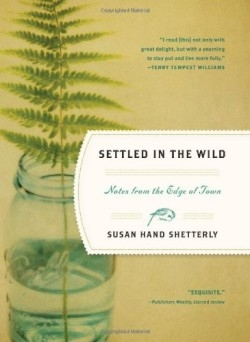Settled in the Wild
Notes From the Edge of Town
“These are the gifts that last,” Shetterly writes. “Small, easy as breathingÂ…they sink beneath what we think they remember, what we think we know.” Her book is full of such gifts—carefully grafted gems of hard-won knowledge of the land, polished by more than thirty years of nature writing experience.
Settled in the Wild lacks a defined narrative thread; rather, it is a series of vignettes stitched together by the thread of Shetterly’s life. The book works on many levels: as a grand examination of mankind’s relationship with Nature; as a realistic account of small-town life; as a deeply personal memoir.
Through all of the stories of cricket bites, adopted ravens, and alewife migrations runs a unifying question: how do we come to know nature and our place in it? In exploring her own life, Shetterly illuminates a sort of natural epistemology. To her, much of this knowledge is innate—built into us as surely as lungs and livers. The trick is finding a way to remember it; to reestablish a connection—long since severed—to the land.
Shetterly’s prose is deft and precise. With a few restrained strokes she cuts to the emotional core of her experiences living amidst nature-particularly the sheer awe of it all. Like nature itself, her book is, by turns, nurturing and unforgiving. Alongside stories of the rehabilitation of young robins, she recounts a tale of a man who cut the still-beating heart out of a snapping turtle just to satisfy his own curiosity. Her book, like life itself, is wonderfully varied.
What sets this book apart from many modern pieces of nature writing is its down-to-earth quality. This book is not a work of philosophy or of science. There is no detached intellectualism. Nor is it a book about abandoning society. Instead, it explores from within the relationships of people in a rural town to both each other and the place in which they live.
This book makes a great read for anyone interested in a first-hand, grounded account of what it is to lead a life in touch with nature. It is a fitting counter-point to more abstract accounts of man’s relationship with nature. The strong focus on community broadens the appeal to anyone interested in a portrait of life in rural Maine.
Disclosure: This article is not an endorsement, but a review. The publisher of this book provided free copies of the book to have their book reviewed by a professional reviewer. No fee was paid by the publisher for this review. Foreword Reviews only recommends books that we love. Foreword Magazine, Inc. is disclosing this in accordance with the Federal Trade Commission’s 16 CFR, Part 255.

